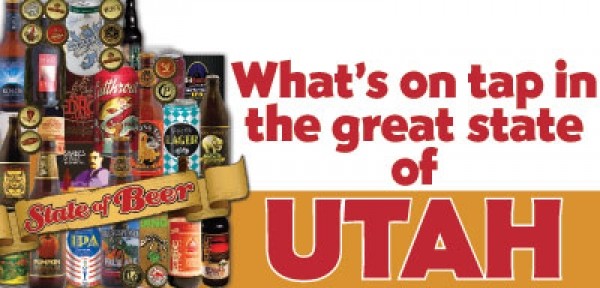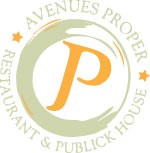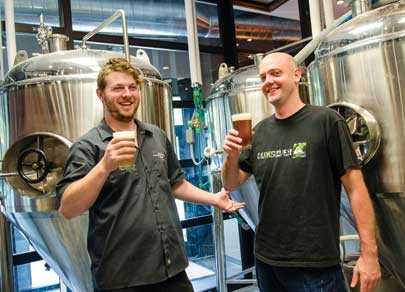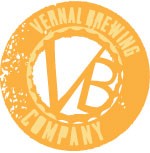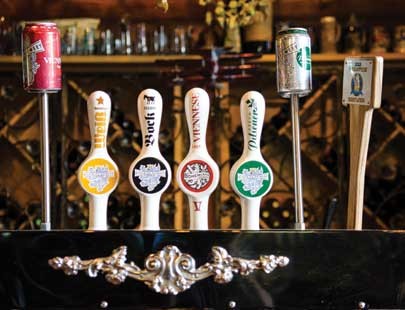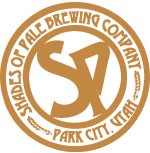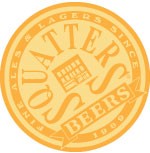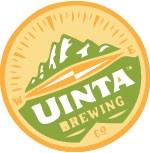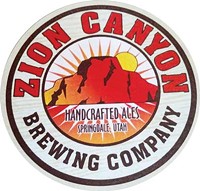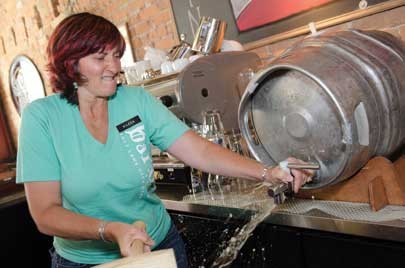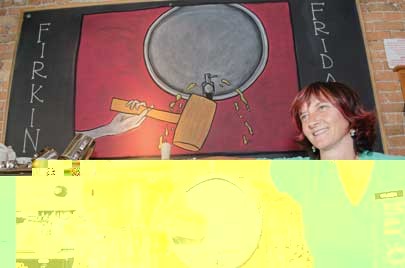It’s City Weekly’s fourth Utah Beer Festival, but it’s been a long time since we’ve done an issue that focuses on born-and-bred Utah beer. With three breweries opening this year alone, the timing seemed perfect to check out these new places, as well as remind our readers about the great craft beer that our stalwart breweries have been producing for years.
And we have to admit to being a bit surprised by just how much new stuff those breweries—from Wasatch, the state’s first, founded in 1986, to Shades of Pale, founded in 2010—have been up to. No, Utah’s award-winning beer makers haven’t been resting on their laurels (or resting at all—many of the brewers we spoke to for this issue work seven days a week).
Instead, they’ve been coming up with new recipes, building communities, reinventing themselves, experimenting with adventurous new projects and putting out more beer in new ways. Sure, it’s all part of business—but it’s clear that their No. 1 goal is to produce high-quality, full-flavored craft beers, from the ubiquitous Cutthroat to tiny, one-off firkin experiments.
The craft-beer movement is booming, but as of 2012, only 10 percent of the beer consumed in America comes from craft breweries. It makes you realize how lucky we in Utah are to have such a strong community of local brewers, especially given our oft-maligned liquor laws. You can find locally made beer in almost every restaurant and bar in the state, and these wholly unique brews are truly the flavor of Utah.
So, sit back and enjoy this beer issue. We recommend pairing it with a local beer of your choice—you’re going to get thirsty.
2013 Draft Class
What’s on tap at the state’s three
brand-new breweries.
Avenues Proper Restaurant & Publick House
Founded: April 28, 2013
The first thing you notice about the Avenues Proper beer list is all the beer they didn’t brew. While most brewpubs naturally focus on their own product, the Proper provides a curated selection of some of Utah’s best beers, bottled and on tap.
“If someone comes in who’s not familiar with Utah beers or from out of state, they can have a really good sampling of everything Utah has to offer,” says general manager and co-owner Andrew Tendick, who started the micro-brewpub with Rio and Liam Connelly, brothers who serve as brewmaster and chef, respectively.
The beers from other Utah breweries—and only Utah breweries—also give Rio more freedom to produce different beers within his small five-barrel system. “He can basically brew whatever he wants to brew, and [the other beers] can fill in the gaps,” Tendick says. “He doesn’t have to always have a stout on, and always have a pale on.”
A longtime homebrewer, Rio learned production brewing under Kevin Crompton at Epic Brewing, where they brewed more than 40 beer styles and started a barrel-aging program within the first year. “I don’t think I could have had a better training to prepare me,” Rio says. He wanted to continue Epic’s ethic of using the highest-quality ingredients, but also work at a slower pace at which he could spend more time perfecting his recipes.
Small batches provide the freedom to screw up. “Worst-case scenario, if I make something that’s really terrible in my experiments, it’s not that much beer that has to go down the drain,” Rio says. “There are things that, if I were to make a large batch of it, I would need quite a bit of a very difficult-to-get or very expensive ingredient.”
The Proper continually rotates its four taps with a variety of styles, some common and some rare, especially on draft, due to Utah’s alcohol-content restrictions. Past and present highlights include a Belgian patersbier trappist ale, a Belgian brown and two delicious nitro ales: the Sláinte Stout and Oatmeal Red, both of which have a nice complexity on top of their smooth, creamy mouthfeel.
The Proper’s most unusual beer to date is Gose the Gozerian—possibly the first gose to be brewed in Utah. The unusual German style’s aggressive, salty-sour taste won’t be for everyone—my server told me that women sometimes have to finish their boyfriends’ pints—but it’s undeniably unique.
And being unique is what the Proper’s best at. Rio says he’s currently working on a saison, a fruit beer and some unusual lagers for Oktoberfest. So whenever you go, you’re in for a surprise born from hops and malts. (Jeremy Mathews)
376 Eighth Ave., Suite C, 385-227-8628, AvenuesProper.com
Bonneville Brewery
Founded: March 2013
Just as you enter Tooele proper, you’ll be greeted by Bonneville Brewery on the west side of Main Street. Before the pub itself opened to the public in March—in a completely gutted, newly renovated space that used to be a rundown bar—beer production started in October 2012. Since Bonneville Brewery owner Brad Shepherd also owns All Star Bowling, that’s where the beer was originally available in late 2012.
Today, Bonneville Brewery is an expansive two-floor, family-friendly space—all ages are welcome downstairs; upstairs is 21 and over—with black & white photos from the ’30s and ’40s on the walls that pay homage to the brewpub’s namesake, the Bonneville Salt Flats, and its historic speed-record racing. “Once we chose the name Bonneville Brewery, that sort of just emerged as a loose theme,” says head brewer Dave Watson.
The legacy of the Bonneville Salt Flats is also reflected in the names of Bonneville Brewery beers, such as Sir Malcolm’s Stout, named after a famous British land-speed record holder. Motorcyclist Rollie Free, for whom the Free Roller Pale Ale is named, is also immortalized in a photo of him at the Salt Flats that hangs near the bar. Another source of inspiration for naming the beers is local geographical features, such as the Silver Island Hefeweizen, named for the Silver Island Mountains.
Bonneville Brewery is a 10-barrel brewhouse that has 10 beers on draft, with eight staple varieties and two rotating seasonal flavors. Watson says the brewery focuses on traditional beers that “run the gamut from a very light golden ale to a dry Irish stout that’s served on nitro—so it’s got that creamy head—and a really hoppy pale ale and a balanced amber ale.” Instead of experimenting with exotic ingredients, Watson creates beers that are “pretty traditional, pretty straightforward,” he says. “A little more focused on solid than wild.”
All spectacular beer needs an equally spectacular food pairing, which is where the work of Chef Joseph Davis comes in. Featuring burgers, pasta dishes and contemporary American food, Davis’ menu was designed to complement the complex flavors of Watson’s beers. “I knew we were going to get along great when they brought him in and introduced me to him, [and] he immediately started asking me about the flavor profiles of the beers because he wanted to keep that in mind while he was designing his menu,” Watson says. Davis also often uses beer as an ingredient in the food, such as in the Hefeweizen batter he uses to fry certain foods, or even in stout barbecue sauce. “He just has strokes of genius like that,” Watson says.
Looking forward, Watson says that Bonneville Brewery is working on expanding the amount of beer the brewery can produce by implementing larger fermenters that have the capacity to produce 30 barrels of beer instead of 10. At some point in the future, Bonneville Brewery hopes to get a bottling line, but until then, one rotating beer is available on draft at The Bayou, the Beerhive Pub, Avenues Proper Restaurant & Publick House and, yes, All Star Bowling. (Kolbie Stonehocker)
Bonneville Brewery, 1641 N. Main, Tooele, 435-248-0652, Facebook.com/BonnevilleBrewery
Vernal Brewing Company
Founded: 2013
Though they haven’t yet served their first beer, Vernal Brewing owners Ginger and Eric Bowden have been working to bring Uintah County into the beer age since they opened their home-brew supply store The Bucket in 2010. “We got started by homebrewing, and had so much fun with it that we decided we would open a brewery,” Ginger says.
Once they had the idea, it didn’t take them long to get going. “It kind of just took on its own life, and we slowly worked through everything,” getting all the permits in place, designing the building and hiring staff, Ginger says.
The operation started at the ground level, with Vernal City having to pass an ordinance to allow the brewery to operate—it’s the first brewery in the county. The city was supportive, as Vernal is a huge tourist destination and “people always ask the chamber of commerce if there’s somewhere they can go have a drink with their meal,” Ginger says.
The restaurant portion of the brewery is open Thursday through Sunday, serving food and pouring Epic, Wasatch and other local brews. Now they’re getting the brewing equipment in place so that they can soon start serving their own beer, says Ginger, whose favorite style of beer is IPA—the Vernal iteration is called Dinobite. They’ve been developing recipes for about four years.
The grand opening of the brewery is “soon,” Ginger says, and they’ll be producing five flagship beers: a kolsch, a smoked porter, an IPA, a lager and a wheat. Once that’s all in place, she says, “we would like to continue to expand.” (Rachel Piper)
55 S. 500 East, Vernal, 435-781-2337, VernalBrewingCompany.com
Beer Bulletin
Utah’s tried-and-true craft brewers all have
something new in the tank.
Bohemian Brewery
Founded: 2001
Signature Beer: Czech Pilsener
Cult Favorite Brew: Cherny Bock. “It has a more unique style,” says Bohemian sales manager Will Gillane. “It’s for a certain kind of beer drinker.”
Where to Get It: At the Bohemian brewpub, on tap at area bars and restaurants, and in cans at grocery stores; Oktoberfest will be available on draft at the brewery restaurant and the Beerhive Pub, The Bayou, Brewvies, Piper Down and Cheers to You.
What’s New: Bohemian brewmasters have regularly created seasonal beers to serve at the Midvale brewpub, but it wasn’t until the past year that anything beyond the brewery’s four staple beers—Czech Pilsener, Viennese Lager, Cherny Bock and Bavarian Weiß—has made it to the outside world. It’s been a year of change; Bohemian launched a new seasonal line and been experimenting with some high-point beers to, Gillane says, “create some excitement and spur interest in our brand.” The buzz has been strong so far, starting with the overwhelmingly positive response to Oktoberfest—a rich, malty lager that was brewed for Snowbird’s 2012 Oktoberfest. Currently, a special Noble Hefeweizen is on select taps around town, and will be replaced by Oktoberfest in late August. “We’re hoping to make that more solid, a stable seasonal plan so that we’ll always have something out there different than our normal four,” Gillane says.
2013 also saw the Bohemian crew on the road at beer festivals in Wyoming and Idaho, taking their high-point beers out for a spin. The beers—an easy-drinking export and a roasty, lagered alt bier—have “gotten a really good response,” Gillane says. And, assuming all goes to plan, cans will be hitting liquor-store shelves in a few months.
94 E. 7200 South, Midvale, 801-566-5474, BohemianBrewery.com
Desert Edge Brewery
Founded: 1972
Signature Beer: The UPA—Utah Pale Ale, an amber-colored ale with some bitterness and lots of hop flavor.
Cult Favorite Brew: Radius, a 100 percent local beer; all ingredients come from a 150-mile radius of the brewery. It’s on tap right now, too.
Where to Get It: At the Desert Edge Brewery in Trolley Square. Don’t expect to see Desert Edge beers on liquor-store shelves anytime soon, says Chris Haas, Desert Edge head brewer. “We want to be a pub always; there aren’t many pubs around,” Haas says. “We’re not that interested in doing a big expansion.” Although if you do find yourself captivated by a particular beer, you can take home a 64-ounce growler bottle.
What’s New: The Pub has been celebrating its 40th anniversary by brewing up Celebrate 40, a heavily carbonated, wood-aged beer. The brewery tries to come out with new brews every six to nine months; this year it’s produced three. Currently, Bagpipe, a Bavarian wheat beer, and Citra in Red, a beer loaded with lime and citrus flavors, are on tap. “If all goes well, we bring it back; if not, we go on to the next one,” Haas says. “It’s hard, though, because often the one we decide not to bring back is still someone’s favorite.”
Trolley Square, 602 E. 500 South, 801-521-8917, DesertEdgeBrewery.com
Epic Brewing Company
Founded: 2008
Signature Beer: Spiral Jetty IPA
Cult Favorite Brew: Big Bad Baptist
Where to Get It: At loads of local restaurants—but for the widest selection, hit the brewery’s storefront at 825 S. State.
What’s New: After years of selling sandwiches and pouring samples at the brewery’s broom-closet-size Tapless Tap Room, Epic is opening a real brewpub in Sugar House called The Annex. Located in the old Granite Furniture building on 2100 South near 1100 East, The Annex will start serving in mid- to late September, if all goes according to plan.
The restaurant will serve gastropub food designed to pair with Epic’s 36 brands of beer. The space will also hold a seven-barrel brewhouse, which will be used to make house-only seasonal brews and firkin specials.
However, you’ll have to look elsewhere for the Unsacred line, Epic’s unbranded line of 3.2 beers. Unsacred exists only because of the state’s “outdated and restrictive alcohol laws,” says Matthew Allred, Epic’s PR director. “We operate in a market which seriously limits our ability to sell our product.” As a brewery dedicated to strong beers, Unsacred doesn’t fit under its umbrella. But if you want to get an Epic-made product on tap or at the grocery store, you know what to look for.
825 S. State, Salt Lake City, 801-906-0123, EpicBrewing.com
The Moab Brewery
Founded: 1996
Signature Beer: Dead Horse Amber Ale
Cult Favorite Brew: Derailleur Ale
Where to Get It: In Salt Lake City, find Moab on tap at O’Shucks, Gracie’s, Porcupine Pub, Maxwell’s and The Green Pig. Three of its beers come in unique four-packs of 16-ounce cans, available at grocery stores; more varieties are available at select State Liquor Stores.
What’s New: Salt Lakers can expect to see a lot more of Moab Brewery, as the brewery is distributing more beers than ever this year. Starting in September, Squeaky Bike Brown Ale will be available at grocery and convenience stores in the brand’s unique four-packs of 16-ounce, colorfully striped cans. Moab’s Desert Select Ales will soon be at liquor stores in 22-ounce bottles. As for new brews, Moab owner John Borkoski says, “We are always working on new stuff. We are kind of keeping it under wraps, but I will say we’re working on a new pale ale.”
686 S. Main, Moab, 435-259-6333, TheMoabBrewery.com
Red Rock Brewery
Founded: 1994
Signature Beer: Bobcat Brown Double IPA
Cult Favorite Brew: Rêve Belgian Trippel. “Rêve is French for dream, and we call it that because it ‘sleeps’ for a year, until it’s perfect,” says Kevin Templin, Red Rock’s brewmaster and co-owner.
Where to Get It: On tap and in bottles at Red Rock Brewpubs, liquor stores, EnergySolutions Arena, Rio Tinto Stadium and pretty much every bar.
What’s New: An always-reliable grass-roots brewery, Red Rock recently expanded operations and now boasts a 10-barrel operation at the brewhouse on top of the main brewery, which is now running a 25-barrel system.
“We’re growing, but we don’t want to be the biggest, baddest or fastest,” Templin says. “We just want to be the one everyone loves.”
This fall, Red Rock will introduce new lager beers, which are expected to join the ranks of delicious, quality craft brew for which Red Rock is known. Red Rock also recently teamed up with New Belgium Brewing Company, a Colorado-based brewery and the third-largest craft brewery in the country, to collaborate on Paardebloem—Flemish for “dandelion”—a fruity pilsner bittered with the weed’s greens, available exclusively at Red Rock locations.
Multiple locations, RedRockBrewing.com
Roosters Brewing Co.
Founded: 1994
Signature Beer: Bee’s Knees Honey Wheat is Roosters’ most-loved brew, and the only one available in both 3.2 percent draft and full-strength bottles.
Cult Favorite Brew: Chocolate Stout, which Roosters has brewed since the beginning.
Where to Get It: On draft at Roosters brewpubs and The Beerhive, Porcupine Pub, Fiddlers Elbow, The Bayou, Brewvies and more; in bottles at the Layton brewhouse and select State Liquor Stores. Roosters also started brewing Dirty Blonde Ale—an easy-drinking, lighter beer; think a local version of Budweiser—for Ogden bar Alleged.
What’s New: The Ogden institution started bottling full-strength beers in 2012. “We came out with completely unique brews, formulas, the whole thing,” says Kym Buttschardt, who co-owns the brewpub with her husband, Pete. The result was three new beers— Peloton Pale Ale; Argo ESB, an extra-special bitter; and Niner Bock, a dark, strong, 9 percent ABV—and one irresistible old favorite: Bee’s Knees Honey Wheat (just called Honey Wheat in bottles), which Kym says is basically “sweet liquid love.”
Sales of the bottled beers have been growing every month, Kym says. “It’s an organic, grass-roots growth—people try the beers, they like it, and they buy more,” she says. “We’re encouraged by that.”
Roosters is eventually planning to open an off-site bottling facility; right now, bottling is happening in the larger Layton location, which opened in 2006 and is part-owned by Steve Kirkland, Roosters’ original brewer and first employee. One of the town’s few independent restaurants, the Layton Roosters has seen a huge response from locals, especially the Air Force community, for whom the location’s Diamondback Ale was brewed.
One of the first tenants of Ogden’s now-bustling 25th Street, Roosters’ main focus has always been “building our community as gathering places,” Kym says. “It’s been really cool to see the 25th Street community grow up around us.” And now, with Roosters turning 20 and its beers becoming more accessible, that community is only getting bigger.
253 25th St., Ogden, 801-627-6171; 748 W. Heritage Park Blvd., Layton, 801-774-9330, RoostersBrewingCo.com
Shades of Pale
Founded: 2010
Signature Beer: Publican Pale Ale
Cult Favorite Brew: The limited-edition Ready to Fly Amber Ale. “People say that it’s our best beer, the most complex that we make,” says Trent Fargher, Shades of Pale’s founder/CEO/brewer.
Where to Get It: Shades of Pale is available on draft and in bottles in bars and restaurants across the state; use the Find the Beer function on ShadesOfPale.com to find out who’s pouring it near you. Grocery and convenience stores stock 22-ounce bottles of Shades of Pale’s lineup. The limited-edition Ready to Fly is available on draft in select locations in Park City and in downtown Salt Lake City, including Flatbread Neapolitan Pizzeria (1044 E. 2100 South, Salt Lake City, 801-467-2180), and in bottles exclusively at Trader Joe’s and Whole Foods.
What’s New: The Park City brewery has grown a slow but steady following after debuting on the beer-festival circuit in 2010. Its three beers—4-Play Porter, Publican Pale Ale and Jack Wagon Wheat—were the first 22-ounce craft beers to hit the grocery stores and, now, “it’s selling well enough that our space is increasing on the shelf, and the distributors are asking for other size packaging,” Fargher says.
But six packs aren’t the only thing Shades of Pale has up its sleeve—the brewery is looking to relocate to a larger facility and upsize equipment “by the time the snow falls,” Fargher says. “We’ve gotten to a point where we physically can’t produce more product.” Expansion will allow Shades of Pale to meet the high demand for current brews, as well as branch out with additional varieties. “I’m getting tired of drinking the same old stuff,” says Fargher, who started out as a homebrewer and has been experimenting with some high-point lines for Shades of Pale. “And beyond just physically expanding our presence, we want to build a community around our brand,” with tours and beer tastings, he says.
1950 Woodbine Way, No. 5, Park City, 435-200-3009, ShadesOfPale.com
Squatters
Founded: 1989
Signature Beer: Full Suspension Pale Ale
Cult Favorite Brew: Hop Rising Double IPA
Where to Get It: On tap and in bottles at The Beer Store, located in the Wasatch/Squatters Utah Brewers Cooperative brewery (1763 S. 300 West, Salt Lake City), Squatters pubs, restaurants, bars, liquor stores, gas stations and grocery stores.
What’s New: Squatters was sold to Fireman Capital Partners, a Boston-based company, in September 2012. Squatters has maintained the same employees, the same managers and the same beer, but has been able to move forward and expand production, says Dan Burick, director of Squatters’ brewing operations. “Fireman Capital Partners was a good fit for Squatters because they love that we keep it local, and they want to keep it that way,” Burick says. “They’re really supportive of our local efforts.”
This year at Squatters, there are new tanks, which were expanded in May and will be expanded again in August, as well as new packaging equipment. Squatters will be coming out with cans in the near future, in response to demand from active craft-beer drinkers.
The brewery has also been experimenting with firkins. Firkins, smaller kegs served on the bar, are a way for Squatters to get creative so people can experience a different taste of the same beer. Burick explains the process as taking 10 gallons of their regular craft beers and adding cherries, apricots, coconut, spices—pretty much anything—to experiment with new combinations of flavors.
147 W. 300 South, Salt Lake City, 801-363-2739; 1900 Park Ave., Park City, 435-649-9868, Squatters.com
Uinta Brewing Co.
Founded: 1993
Signature Beer: Cutthroat Pale Ale, which is sold only in Utah.
Cult Favorite Brew: It’s a tie between Hop Notch—a new IPA launched in 2012—and Baba, a light, sessionable black lager.
Where to Get It: Liquor stores, grocery stores, bars and restaurants, Uinta’s brewhouse pub.
What’s New: In late 2011, Uinta went through a complete redesign and launched its Organic, Classic and Crooked lines. “When we started the redesign, a lot of the concern was wanting to be recognizable, and to still keep with the spirit of Uinta, which is embracing Utah in a positive way,” says Lindsay Berk, Uinta’s marketing manager. The redesign was both subtle (Cutthroat is still a jumping fish on a red background, but it’s more stylized, drawn with thicker lines; it’s a trout with personality) and striking—with bold colors, clean lines and a new, propriety bottle in a shorter, rounder shape with a compass around the neck. “We’re very passionate about the beers we’re brewing, and we’re confident in the quality of them,” Berk says. “With the redesign, it was a matter of getting that beer in people’s hands, and have them make that connection on the shelf.”
And it worked: The company saw 67 percent sales growth the next year. Uinta is now in Phase 3 of an expansion that will triple Uinta’s capacity. What this means for the consumer is that there’s more Uinta beer than ever; the company’s brews can be found in 26 states, which is where some of that 2012 growth came from—while no new markets were added, the places already carrying Uinta around the country simply wanted more of it.
And, thanks to that expansion, Uinta was able to fulfill a years-long goal of canning its beers so they can keep up with the state’s outdoor enthusiasts. Hop Notch, Wyld, Baba and Cutthroat are all being canned in a new system that knocks out 400 cans per minute, and are available on store shelves now.
1722 S. Fremont Drive (2375 West), Salt Lake City, 801-467-0909, UintaBrewing.com
Wasatch Brewery
Founded: 1986 in Park City (Utah’s first)
Signature Beer: The aptly named Devastator, an 8 percent amber lager.
Cult Favorite Brew: Recent addition Ghost Rider, a dry-hopped 6 percent IPA made with “super pale” barley and wheat, as well as a hint of coriander and a cool illustrated cowboy label that gives you a tough-guy/girl air.
Where to Get It: Wasatch’s higher-ABV beers are available at State Liquor Stores, most local bars and The Beer Store, located in the Wasatch/Squatters Utah Brewers Cooperative brewery (1763 S. 300 West, Salt Lake City). Wasatch 4 percent beers are available at bars, grocery stores, gas stations and The Beer Store.
What’s New: In 2012, it was announced that Wasatch and Squatters would merge into a single suds entity, which Utah Beer blogger Mike Reidel joking future-titled “Squasatch.” Whatever it will be called, Wasatch/Squatters (thanks to a $35 million investment from Boston equity firm Fireman Capital Partners) plans to open more breweries in other states, as well as amp up canning locally—so practice saying, “Toss me a can o’ Squasatch, man.”
250 Main, Park City, 435-649-0900, WasatchBeers.com
Zion Canyon Brewing Company
Founded: 2005
Signature Beer: The Jamaican Style Lager has held the title for a while, but ZCBC’s new English-style amber is selling well at the ZCBC brewpub.
Cult Favorite Brew: The Virgin Stout. “My stout recipe has taken on a cult following,” says master brewer James Valderrama. Women who come into the brewery and say they prefer wine to beer often end up leaving with a six-pack of the silky-smooth stout, he says, which has roasted notes and a strong chocolate flavor.
Where to Get It: On tap at the brewpub and southern Utah restaurants, in bottles on the shelves of southern Utah grocery stores.
What’s New: After changing ownership two years ago, Zion Canyon Brewing Company has been going through a restructuring. Valderrama, who’s been with the company for about nine months, changed all of the recipes; he and staff have been working hard as they take a new approach with the brewery and uphold “the integrity of the craft,” Valderrama says. The company recently pulled its five bottled beers—Jamaican Style Lager, Springdale Amber Ale, Hop Valley IPA, Virgin Stout and Extra Special Bitter—out of the Salt Lake City-area market, making a decision to focus on markets in southern Utah, as well as Arizona and Nevada.
But Salt Lakers might soon see ZCBC high-point beers on liquor-store shelves: Valderrama hopes to have two high-point beers out soon: Rockville Rye (7.4 percent ABV) and No Ropes Black IPA (8.4 percent ABV). Until then, visitors to southern Utah get to have all the fun, including the Angels Landing Apricot Ale and the North Rim Trail Hefeweizen, which are exclusively on draft at the ZCBC brewpub, nestled at the base of some of the area’s most astounding red-rock formations.
2400 Zion Park Blvd., Springdale, 435-772-0404, ZionCanyonBrewingCo.com
Nano Brews
Local brewers experiment with adventurous small-batch beers.
By Jeremy Mathews
Sometimes the old reliables need a break. Seasonal specialties, one-off experiments and one-time variations are part of what makes local brewing so fun. And Utah’s breweries have plenty for people looking for a beer that’s fresh and fleeting. See what’s on tap at your favorite brewpub or look for limited high-point bottles like the Squatters Small Batch Series and Epic’s wide array of limited editions.
There’s one creed to remember when it comes to small-batch beer: Drink up today, for tomorrow it may be gone. Some of us are still waiting for Bohemian to make more zoigl, and lovers of barrel-aged dark beer are struggling to survive the gap between batches of Uinta’s Sea Legs Baltic Porter.
For brewers, smaller projects are “really the outlet that lets us … explore and learn more about new ingredients and new processes and new beer,” says Kevin Ely, head brewer and production manager at Uinta Brewing Company. “You have an idea what it’s going to be like, but you don’t know until you do it.”
Uinta recently released a one-off hoppy wheat ale made with a proprietary hop blend from the Ales for ALS fundraising project. Ely says you can call it “a session white IPA or an American-style witbier.” Whatever you call it, it’s fun and refreshing to drink, and it won’t be around next month.
Uinta also collaborated with local homebrewer Chris Detrick to create Cahoots, a limited-edition double-rye IPA from Uinta’s Crooked Line. Uinta made a single-rye IPA with Detrick as part of the Great American Brew Festival’s Pro/Am competition, and decided to explore the style further. “We had actually never brewed a rye beer at Uinta before,” Ely says. “We have some brewers who had brewed with rye on a homebrew scale, but we’d never done one at the brewery itself.”
Utah breweries have started making small batches really small with one-day-only brews in firkins. Firkins are small barrels that hold around 9 gallons, and are typically used for cask-conditioned beer. Cask ales are made via a traditional method that uses only natural carbonation. “This refermentation in the cask, the lack of carbon dioxide for dispensing and the exposure to air while serving yields a very different beer than most Americans are used to,” says Mark Alston, owner of The Bayou. “The beer will be chock-full of flavor while being quite low in carbonation.”
Hoppers, the downtown Red Rock and Poplar Street Pub have been doing firkin specials, and in June, The Bayou brought in seven local breweries to launch its Firkin Friday series. Each week, one brewery supplies a special beer to be served on Firkin Friday. The program is now on its second rotation through breweries.
The aforementioned exposure to air means that a beer can change quite a bit between when it’s tapped (at 3 p.m. at The Bayou) and last call. After that, it’s gone. And when hops and/or other extra flavoring are added to the cask during the carbonation process, it makes the beers even more unique. “Even if the brewer tried,” Alston says, “it is almost impossible to reproduce the same cask twice.”
The cask could give new flavor notes to an old standby, like Uinta’s variation of its Trader IPA, or set the stage for an adventurous experiment, like Desert Edge’s Rosemary Blonde Kristal Weizen or Hoppers’ Wild Blueberry & Fresh Lemon Wheat.
“The cask beers are fun because you get a little bit different taste, a little bit different flavor profiles,” Ely says. “People seem to be a little more accepting of the traditional style. It’s going to be unfiltered and a little bit hazy.”
There are many more techniques to be explored. Alston says The Bayou is experimenting with a series involving a device called a Randall, which adds flavors to beer as it comes out of the tap. Alston says they’re still working out the bugs, but “we had some good success with a candied-ginger pilsner.”
And as long as there are unexplored ingredients and methods, local brewers will continue to search for new aromas and flavors. As Ely says, “We always just want to make another beer that we really like to drink.”
More by City Weekly Staff
-
Dining Guide 2024
Bite into the trends, innovations and classic staples of Salt Lake’s food and beverage scene.
- Apr 24, 2024
-
MUSIC PICKS APR 25 - MAY 1
Krizz Kaliko @ Liquid Joe's 4/25, JOYRYDE @ Sky SLC 4/25, Cypress Hill @ The Complex 4/29, and more.
- Apr 24, 2024
-
THE ESSENTIAL A&E PICKS FOR APR 25 - MAY 1
Diane Tuft: Entropy panel discussion and book launch, Fem Dance: As within, so without, Come from Away, and more.
- Apr 24, 2024
- More »
Latest in Cover Story
Readers also liked…
-
Forget the family pedigree—Robert F. Kennedy Jr should not be the next president of the United States
Trojan Horse
- Jun 21, 2023
-
Women decry harassment and toxic culture at St. George auto dealership
Men at Work
- Oct 11, 2023


